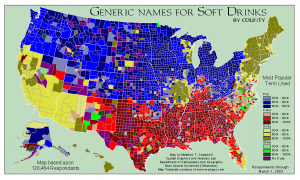
Got snowclones? You might not have heard of a snowclone, but chances are you’ve used one recently, perhaps without even knowing it. “50 is the new 30” or “sitting is the new smoking” you might have suggested, feeling a little bit clever. “Discretion is my middle name”, you could have said reassuringly. “Thanks be to Godot” was how a friend signed off wittily in the 48 hours before Thanksgiving…
A snowclone, according to the person who first identified and named it, is “a type of cliché or formulaic expression (such as ‘Much ado about X,’ ‘X is the new Y,’ or ‘X leads the league in Y’) that ‘can be used in an entirely open array of different jokey variants by lazy journalists and writers’.” About a decade ago, linguists began collecting these formulaic or pattern-based clichés on Language Log, a popular linguistics blog. In January 2004, soon after linguist Geoffrey Pullum identified this particular type of phraseology and invited a discussion about it on the blog, economist Glen Whitman coined the term snowclone, it was endorsed by Pullum, and it’s been used ever since by linguists, language commentators, journalists and authors, all happy to have a name for this quirky practice. Yes, Virginia, there is a name for such clichés. In a piece on The Economist‘s Johnson blog, “G.L.” described his (or her) “Eureka” moment on discovering the concept of the snowclone: “It is a phenomenon so pervasive and mundane that it never occurs to you to give it a name, but once you discover that there is one, you wonder how you managed without it.”
But even with its spanking new name and identity, the snowclone has had a pretty bad rap. Just a few days after it was christened, the linguist Mark Liberman — using a snowclone to make his point — pronounced on the same blog that “snowclones are the dark matter of journalism”. Granted, they can be hard worn and hackneyed, but give them a break: they have been in use for a very long time — more than a hundred years, in fact.
“X is my middle name” is widely thought to be one of the oldest snowclones on record. As Glossographia pointed out, “the entry for middle name in the OED has been relatively recently updated, and includes numerous instances of this figurative use going back to 1905, where the New York Journal has “For retiring you’re—well, that’s your middle name” and other quotations going up to the present. I did a little further searching around and was able to find an earlier one going back to 1902, in the Manitoba Free Press, quoting a correspondent from Dawson, Yukon Territory …: ‘Fight is my middle name’.”
The 21st century has seen something of an explosion of snowclonology, as tropes and memes proliferate online, and our all-pervasive culture of sampling, imitating and riffing on retro or just pre-existing material becomes reflected in the snappy repartee, referential song lyrics and generally clever discourse of our time. When Radiohead sang “Down Is the New Up” in 2008, they were jumping on a bandwagon by using one of the more common modern examples of a snowclone cliché. The origins of “X is the new Y” are a little murky, although it’s understood that it started life as “X is the new black” (a twist on the original fashion motto “pink is the new black”), and then became more general as time went on. Language Log has explored this particular snowclone’s history, noting that its pink origin is commonly but mistakenly attributed to Gloria Vanderbilt in the ’60s. Barry Popik tracked down some early examples of “X is the new Y” published in newspapers of 1979: “colors are the new neutrals” (in the New York Times) and “pearl grey is the new neutral” (in the Chicago Tribune). Now broadened to way more than just a matter of color, X is the new Y is the new oldest cliché in the book.
The Snowclones Database presents a good read about particular phrases — especially the ones with their origins in much earlier times — that are unambiguously legitimately snowclones. However, as the snowclone has invaded our colloquial lingo so aggressively, its definition has started to loosen and sag; new, sometimes iffy snowclones are creeping into our vernacular every day, making it more difficult for linguists and word-nerds to ‘officiate’ and decide what actually constitutes a snowclone. To be (a snowclone) or not to be (a snowclone)? That is the snowclone question…
Jack Schmidt’s wiki page of snowclones is another good resource, especially as it identifies the origins of some classic clichés through the ages. But the page fell victim to this snowballing increase in snowclonology and snowclonological debate, and it ended up having to go on hold — publishing this rather sad disclaimer in 2008: “This page is intended to develop an encyclopedic article on the historical development of pattern based cliches. It has sometimes been in a reasonable state, but due to the faddish nature of its popularity, the article quickly spiraled out of control. As the fad fades, more reputable and scholarly sources are emerging to sort out the noise from the culture.”
Let’s hope the snowclone can emerge unscathed from its overblown popularity and exploitation. It came, it saw, it snowcloned.
Meanwhile, here are some classic examples from Jack Schmidt’s page*, grouped chronologically according to when the originating phrase was first uttered in its virgin form.
Pre-16th century:
“I came, I saw, I Xed” — from Julius Caesar “Veni, vidicon, vici” (Latin for “I came, I saw, I conquered”)
16th century:
“To X or not to X” — from “To be or not to be” from Shakespeare’s Hamlet.
* “A(n) X! A(n) X! My kingdom for a(n) X!” — from “A horse! A horse! My kingdom for a horse!” from Shakespeare’s Richard III
17th century:
“I X, therefore I Y” — from Descartes “I think, therefore I am”
19th century:
“Yes, X (often Virginia), there is a Y” — from “Yes, Virginia, there is a Santa Clause”, from an editorial by Francis Pharcellus Church in the New York Sun (1897)
1910s:
“The X to end all Xs” — from a popular saying that the first world war was “the war to end all wars”
1950s:
“Have X, will Y (often travel)” — from “Have Gun — Will Travel”, a late ’50s TV western
1990s:
“Got X?” — from the Got Milk? ads produced for the California Milk Processor Board
“You had me at X” — from “You had me at hello”, from the film Jerry Maguire
* all but one: I added “An X! An X! My kingdom for an X!”











